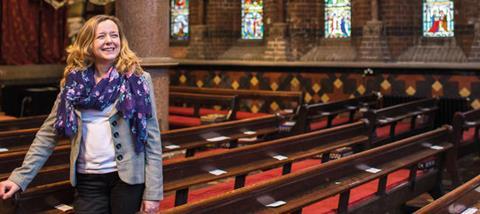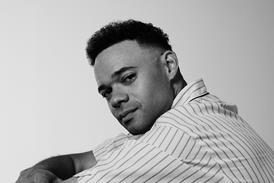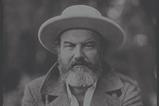Thousands will attend Dr Paula Gooder’s New Testament teaching at Spring Harvest 2015. She tells Justin Brierley why being a theologian, author, speaker, mother and wife doesn’t mean she’s Superwoman.

When people ask me about Paula Gooder, I sometimes describe her as ‘the female NT Wright’. I know that defining a female Bible scholar by a male counterpart runs the risk of sounding patronising, but it is meant as a compliment. Indeed, the similarities are marked, and why shouldn’t they be, since she was taught theology by the pre-eminent evangelical Bible scholar himself?
Like her mentor, she has developed a gift for turning top-level New Testament scholarship into accessible and helpful theology for normal Christians. Her gifts of communication, both in print and in person, have seen her grow in demand as an author and speaker. Her books such as Heaven (SPCK) and Journey to the Empty Tomb (Canterbury Press) have been praised for shedding fresh, first-century light on familiar topics. In 2014, she was invited to lead the Bible teaching sessions at Spring Harvest, and she will do so again this year.
IT WAS A REMARKABLE EXPERIENCE OF GOD...I FELT SOMEONE ELSE WAS MOVING THE PEN
Growing up as the daughter of a vicar in an inner-city parish in Manchester, Gooder readily admits that her journey to faith was undramatic compared to the vivid testimonies of wayward converts that she heard (‘Chance would be a fine thing,’ she laughs). She says faith came naturally to her as a studious teenager as ‘a story of gentle faithfulness, with some enormous moments dropped in where I experienced the presence and the awesomeness of God’.
Public speaking also came naturally from an early age, as Paula’s parents encouraged her to develop her gifts of preaching and teaching in her local church. In the end, her path wouldn’t take her into ordained ministry (my words are chosen carefully for reasons that will become apparent), but towards an academic vocation. After several years of teaching, she took the step of becoming a ‘freelance theologian’, giving her the space to do more speaking and writing as well as allowing her to take on numerous roles such as resident theologian for the Bible Society, and canon theologian of Birmingham and Guildford cathedrals. Parish life remains an everyday reality, however, as she is married to Peter, a vicar in the Birmingham diocese. The couple have two daughters.
Mum, theologian, author and main-stage speaker: it must take a lot of confidence to be Paula Gooder?
No, I wouldn’t say I have confidence. I do it because I have to; because God has me nailed and I have to do this.
You have become a prominent Bible scholar, but there aren’t many other women in the field. Why is that?
There are not many of us around, it must be said. I think there’s something about female scholarship being modelled. It takes a lot to say, ‘I think I could do that.’ There’s also a vast dropout. You have almost 50-50 women and men studying at undergraduate level. The number of women goes down when you get to graduate studies, and then after that it drops down again. There are some female theologians coming through, but not as many as I would like to see. I think we should be getting towards 50% by now.
Did you ever feel called to ministry in the Church?
Yes, but I’d quite like to correct your question. I was once talking to a Church of England bishop and he said to me: ‘So, what do you do?’ I said: ‘I’m a passionate biblical scholar, I preach regularly, I’m a reader in the Church of England, I’m a member of the General Synod, I’m a canon of various cathedrals…’ And I went on with my very long and quite dull biography.
At the end he asked me your exact question, at which point I almost grabbed him by his neck to say, ‘Yes! I have been called to ministry, and guess what? I’m doing it! It’s just that I’m not doing it in an ordained capacity.’
I’m a layperson and one of my big passions is actually for everyone to learn the confidence to say, ‘I’m in ministry.’ Everyone who’s a Christian is in ministry, so my answer to your question is, ‘Yes, I have felt called to ministry, and yes, I am doing it!’
I stand corrected! What about ordained ministry, then?
Yes I have, but for me it was a really interesting experience, because it confirms me in the ministry that I now do. It was at the time when women were newly ordained into the Church of England, but the person I was talking that through with thought it would be really dangerous to have academic women in the Church of England.
THE CHURCH NEEDS ACADEMIC WOMEN, JUST AS IT NEEDS ACADEMIC MEN
‘You should just have nice pastoral women,’ she said to me.
I had to choose whether I wanted to be an academic or whether I wanted to be ordained, at which point I stuck my nose in the air and walked away. There was no doubt in my mind that I was called to academic theology. If I had to choose, I would choose academic theology over pastoral ministry. But she was quite wrong and the Church does need academic women, just as it needs academic men.
When did your passion for theology and the Bible emerge?
In my teens. I was a weird teenager…when everyone else was off partying, I was at home learning Latin and Greek. I thought I wanted to study Classics, so I prepared myself for applying to university to do so. I got to the box where it asked what subject you want to do. I thought ‘Classics’ and wrote ‘Theology’. It was a most remarkable experience of God, where it was almost as though I felt someone else was moving the pen and writing ‘Theology’.
I fancied going to Oxford, but I rather superficially chose the college by whether it had a lake or not. I went to Worcester College, where it turned out that NT Wright was tutor. Maybe God had something to do with it, too. From there my absolute love of the New Testament blossomed. It is impossible to be in a room with Tom Wright and not get excited about the New Testament.
You were an unusual teenager because you started preaching at your dad’s church from an early age...
There was one particularly memorable occasion. I must have been about 17 and someone we’d never met before came in, dressed very finely in African robes, walked straight down the aisle while I was preaching, went behind me, did something that I couldn’t see, then walked straight out again!
What would you say are your favourite parts of the Bible?
My second name is Ruth, so one of the top stories has to be Ruth. And I called my daughter Ruth as well, because I adore that story of a woman who shouldn’t have been able to do any of the right things because she was an outsider from Moab, and everyone knows that Moabites are no good. Here she is, this person who illustrates being what God wants his people to be; this complete outsider-nobody. I love that story.
Some criticise the Bible’s treatment of women. What do you think of the way women are perceived in scripture?
It’s very easy for us to overestimate the way in which women are treated in the Bible, because we’re using 21st-century criteria to judge people from the ancient world. Actually, if you judge them against other cultures – the Babylonian or Hittite narratives – women in the Old Testament are treated far better.
The other thing to bear in mind is that the scriptures come out of a tradition in which men take a public sphere and women take a much more private sphere...So if you’re writing big national history you are going to write more about men than you write about women, simply because a story about what happened on a Monday morning in February in someone’s house is going to be of less significance than, say, the story of David and the shaping of the nation of Israel.
You need to read it for what it is rather than what it isn’t. One of the things that I love to do is read between the cracks and say, ‘Ok, here’s the dominant narrative, now let’s just read under-the-surface narrative.’ Then you get stories of these amazing women, people like Miriam, Ruth and Esther, and in the New Testament, Phoebe, Lydia and Mary. In them you can see these powerhouses of women.
What difference did Jesus bring to the status accorded to women?
If you lay aside the 12 for a moment, it is absolutely amazing to see how many women Jesus engaged with and became disciples. It’s clear the Gospels use the word ‘disciple’ for the wider group, not the smaller group. In a world in which, within the rabbinic texts it was absolutely forbidden for women to be disciples and learn, Jesus had many female disciples. So he is already turning tradition on its head and changing things for good.
One of the things I love about John’s Gospel is that the very first evangelist is a woman; the first person ever to break the news of Jesus is a Samaritan woman. The person entrusted with the news of the resurrection was another woman. Here are women making an enormous difference in the life of Jesus.
You are balancing being a scholar, speaker, author, mum and vicar’s wife. What’s the secret to your success?
Run quickly! My experience of life is that actually you never get to that beautiful moment in the future where life is balanced, serene and perfect.
GOD HAS ME NAILED AND I HAVE TO DO THIS
My absolute priority is my family, and if I ever feel that I’ve neglected them, then other things have to go in order to be able to be properly there for them.
You will always get it wrong, because you just can’t quite ever get it entirely right. The goal is to get it the least wrong that you can. But I’ve also learnt that one of the best things I can do for my family is to live the vocation that God has called me to, because I’m a much better mother when I’m happy and fulfilled than when I’m bored and crotchety.
Dr PAULA GOODER will be teaching at this year’s Spring Harvest. For last-minute availability, visit springharvest.org. Hear this interview in full on Premier Christian Radio on 28th March at 4pm




































